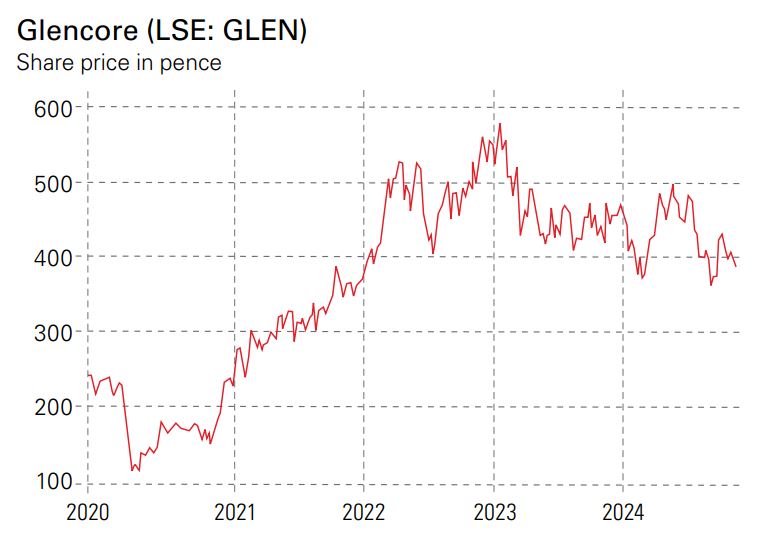Invest in Glencore: a cheap play on global growth
Glencore looks historically cheap, yet the group’s prospects remain encouraging


Get the latest financial news, insights and expert analysis from our award-winning MoneyWeek team, to help you understand what really matters when it comes to your finances.
You are now subscribed
Your newsletter sign-up was successful
Want to add more newsletters?

Twice daily
MoneyWeek
Get the latest financial news, insights and expert analysis from our award-winning MoneyWeek team, to help you understand what really matters when it comes to your finances.

Four times a week
Look After My Bills
Sign up to our free money-saving newsletter, filled with the latest news and expert advice to help you find the best tips and deals for managing your bills. Start saving today!
In 2022, copper was the world’s hottest commodity. The price had surged from $6,000 per tonne in 2019 to $11,000 by mid-2021. Analysts were predicting further growth as the green transition turbocharged demand. Gary Nagle, the head of Glencore (LSE: GLEN), one of the world’s largest commodity companies, told the Financial Times that the copper supply would need to rise by an extra million tonnes a year by 2050 to meet green-energy targets. That demand, he predicted, would drive prices to $15,000.
However, far from spiking, prices have consolidated. The price dropped to a post-Covid low of $7,000 a tonne in mid-2022 before rising to nearly $11,000 a tonne early this year. It has since dropped back to the mid-$9,000 level. Still, the demand for copper hasn’t gone away. Australian miner BHP expects the world to consume an extra one million tonnes of copper per year until 2035. The demand for green energy and artificial intelligence (AI) data centres will drive the growth. AI could increase global copper demand by 3.4 million tonnes a year by 2050, BHP’s chief financial officer, Vandita Pant, told the Financial Times in September. So the outlook for the red metal appears to remain strong, but this year, weak demand in China has weighed on copper prices. Concern over China’s economic prospects has also hit the mining sector.
A successful turnaround for Glencore
Shares in Glencore, one of the world’s largest copper producers and traders, have tracked the copper price over the past five years, although the connection has broken down in recent months. The price of copper has risen around 10% this year, but Glencore’s stock has slid 8%, which could present an opportunity.
MoneyWeek
Subscribe to MoneyWeek today and get your first six magazine issues absolutely FREE

Sign up to Money Morning
Don't miss the latest investment and personal finances news, market analysis, plus money-saving tips with our free twice-daily newsletter
Don't miss the latest investment and personal finances news, market analysis, plus money-saving tips with our free twice-daily newsletter

Glencore has come a long way since 2015. That year, shares plunged 75% as investors lost confidence in its ability to manage its highly leveraged balance sheet. Glencore is one of the world’s largest miners, mining everything from gold to lead, zinc and copper. It also operates a vast trading and marketing network, buying, selling and moving key commodities around the world. This is where the company relies on debt to fund the buying and selling of commodities. While trading can be a risky business, it gives the company a unique insight into the global economy and commodity markets.
Glencore went into the 2015 downturn with $30 billion of net debt, but its aggressive turnaround plans saw this reduced to $10 billion, a level management has set as the group’s long-term target. The group has also made substantial efforts to reduce its legal exposure. Following a series of investigations and fines from the US Department of Justice, Glencore has reduced its reliance on high-risk, third-party agency traders, reducing risk across its operations.
Furthermore, management has removed uncertainty around the future of the group’s thermal coal arm. Earlier this year, Glencore completed the $6.9 billion purchase of Teck Resources’ coal business, Elk Valley Resources. It has said it would seek to combine these assets with its coal assets and spin them off into a new entity. Glencore wanted to draw a line under its exposure to coal and its reputation as a dirty, polluting fossil fuel in the hopes the remaining business would attract higher earnings multiple as a green metals-focused play.
This was a good plan, in theory. In practice, investors didn’t buy into the spin-off. Coal might be a dirty fossil fuel, but it’s a hugely profitable business for Glencore. It accounted for 47% of adjusted earnings before interest and tax during the first half of 2024, and between 2021 and 2023, Glencore earned $51 billion from its core assets, including coal; its current market value is only $65.5 billion. What’s more, there was scepticism that the spin-off would achieve the value required for the remaining company. Glencore said shareholders had been sceptical about the “scale of a potential MetalsCo [the remaining business] valuation uplift arising from a demerger”. Instead of the spin-off, Glencore has doubled down on its growth plans, and intends to return capital to investors.
Should you invest in Glencore?
These cash returns could be substantial. In its half-year results, Glencore guided for free cash flow of $6.1 billion in its current financial year, which, it said, “augurs well for potential top-up shareholder returns, above our base cash distribution, in February 2025”. Analysts’ estimates suggest the company’s shares will offer a dividend yield of 3.1% in 2024, rising to 4.6% in 2025 at the current price. That’s without including any potential share buybacks.
Despite the company’s tremendous progress since 2015, it’s actually cheaper today than it was at the time. The company is trading at an enterprise value to earnings before interest, tax, depreciation and amortisation (EV/Ebitda) ratio of 5.3 times, down from 8.6 times in mid-2015 and below the 10-year average of six times.
There are plenty of potential catalysts for the company in the near and long term: there’s the demand for copper, which is only set to increase; the steady demand for thermal coal, a cash cow for the group; and the potential re-awakening of the Chinese economy. China has been a headache for commodity markets in the last few years, but the country has pumped over a trillion dollars into the economy over the past month, alleviating some of the pressures that had weighed on demand. The fundamentals of the markets in which Glencore operates remain robust, but the company’s valuation seems to ignore the potential for long-term growth.
This article was first published in MoneyWeek's magazine. Enjoy exclusive early access to news, opinion and analysis from our team of financial experts with a MoneyWeek subscription.
Get the latest financial news, insights and expert analysis from our award-winning MoneyWeek team, to help you understand what really matters when it comes to your finances.

Rupert is the former deputy digital editor of MoneyWeek. He's an active investor and has always been fascinated by the world of business and investing. His style has been heavily influenced by US investors Warren Buffett and Philip Carret. He is always looking for high-quality growth opportunities trading at a reasonable price, preferring cash generative businesses with strong balance sheets over blue-sky growth stocks.
Rupert has written for many UK and international publications including the Motley Fool, Gurufocus and ValueWalk, aimed at a range of readers; from the first timers to experienced high-net-worth individuals. Rupert has also founded and managed several businesses, including the New York-based hedge fund newsletter, Hidden Value Stocks. He has written over 20 ebooks and appeared as an expert commentator on the BBC World Service.
-
 Review: Eliamos Villas Hotel & Spa – revel in the quiet madness of Kefalonia
Review: Eliamos Villas Hotel & Spa – revel in the quiet madness of KefaloniaTravel Eliamos Villas Hotel & Spa on the Greek island of Kefalonia is a restful sanctuary for the mind, body and soul
-
 How a ‘great view’ from your home can boost its value by 35%
How a ‘great view’ from your home can boost its value by 35%A house that comes with a picturesque backdrop could add tens of thousands of pounds to its asking price – but how does each region compare?
-
 Three key winners from the AI boom and beyond
Three key winners from the AI boom and beyondJames Harries of the Trojan Global Income Fund picks three promising stocks that transcend the hype of the AI boom
-
 RTX Corporation is a strong player in a growth market
RTX Corporation is a strong player in a growth marketRTX Corporation’s order backlog means investors can look forward to years of rising profits
-
 Profit from MSCI – the backbone of finance
Profit from MSCI – the backbone of financeAs an index provider, MSCI is a key part of the global financial system. Its shares look cheap
-
 'AI is the real deal – it will change our world in more ways than we can imagine'
'AI is the real deal – it will change our world in more ways than we can imagine'Interview Rob Arnott of Research Affiliates talks to Andrew Van Sickle about the AI bubble, the impact of tariffs on inflation and the outlook for gold and China
-
 Should investors join the rush for venture-capital trusts?
Should investors join the rush for venture-capital trusts?Opinion Investors hoping to buy into venture-capital trusts before the end of the tax year may need to move quickly, says David Prosser
-
 Food and drinks giants seek an image makeover – here's what they're doing
Food and drinks giants seek an image makeover – here's what they're doingThe global food and drink industry is having to change pace to retain its famous appeal for defensive investors. Who will be the winners?
-
 Barings Emerging Europe trust bounces back from Russia woes
Barings Emerging Europe trust bounces back from Russia woesBarings Emerging Europe trust has added the Middle East and Africa to its mandate, delivering a strong recovery, says Max King
-
 How a dovish Federal Reserve could affect you
How a dovish Federal Reserve could affect youTrump’s pick for the US Federal Reserve is not so much of a yes-man as his rival, but interest rates will still come down quickly, says Cris Sholto Heaton